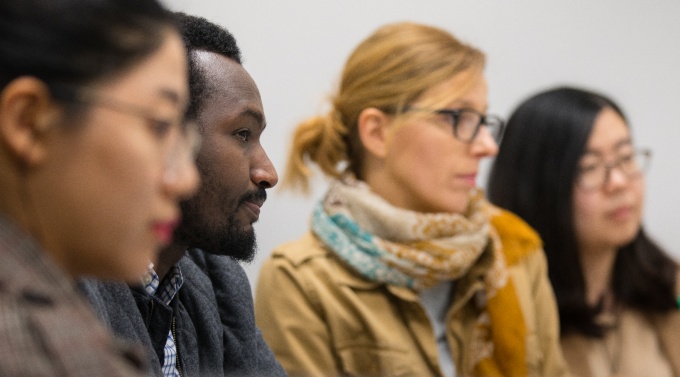Graduate Courses

The Department of Global Gender and Sexuality studies is committed to intersectional gender analysis, exploring the complex intersections of women, gender, race, class, sexuality and disability. Our objective is to inspire critical thinking in our students, challenging them to integrate local and global knowledge and to link theory and practice across a wide range of disciplines.
Course Registration
Sample Courses
GGS 518 Readings in Feminist Theory
Feminist theories represent a complex and ever-expanding body of work that is truly interdisciplinary in its topics, themes, scope and impact. Over the semester we will be reading works within the broad rubric of Liberal, Radical, Socialist, Psychoanalytic, Postmodern, Black, Chicana, Native American and Global/Transnational feminist theory. In addition to analyzing key foundational works associated with each of these schools of thought, we will also be focusing on a number of recent works that seek to engage with many of the fundamental debates that have emerged within feminist theory.
GGS 521 Democracy & Gender (Dual listed with GGS 421)
How are democracy and transition to democracy interconnected with gender? This course will survey recent debates about democratic transitions and diffusion of democracy. Conceptual and practical understanding the concept of democracy; democratic principles; processes of democratization and re-democratization; types of democratic systems; and the most suitable conditions for development of democracy, will constitute the core of our investigations. Through lively class discussions, we’ll assess the impact these forces have on gender relations; culture and cultural identity; women vs. men social, economic, and political opportunities; and maternal health in contemporary United States, and in other countries.
GGS 525 Women’s Movements (Dual-listed with GGS 425)
This class explores current developments in women’s, feminist and sexual minority movements. These social movements have reshaped politics, economics and cultures across the world. The class will explore the current connections between local, national, regional and global women’s activism. Readings will be drawn from a variety of fields and cover a wide geographic area. Basic questions will be examined such as: Why and when do women mobilize? What have been the demands of recent women’s, feminist and sexual minority movements in different countries, and how are these demands connected across nations and regions? What role have transnational networks played in local and national women’s organizing? Why and when have transnational or regional networks been created? What roles do women’s, feminist and sexual minority movements play in the global flows of culture and capital? How should we understand the relationship between transnational women’s networks and other international institutional actors (the UN, international NGOs) and other movements (anti-globalization, labor and environmental movements)?
GGS 560 Special Topics: Art and Activism
The course will analyze a number of paradigms of activist art and the political ideologies informing them, ranging from socialism, and communism to capitalism, and including feminist histories and theories of gender and sexuality as well as discourses around performance art and theory. Among others, we will discuss such art collectives and artists as the Situationist International, ACT UP, Guerrilla Art Action Group, subROSA, Neue Slowenische Kunst, Guerrilla Girls, Voina, Chto Delat?, Black Lives Matter, Xenofeminist Collective, and Femen. These examples will function in a host of paradigmatic ways from which students will identify their own artists/collectives for their research projects, expanding the discourse about art and activism in their individual presentations, research that not only examines a body of artistic production but does so in the context of particular political ideologies and their concomitant social, economic, and political conditions.
GGS 560 Special Topics: Women's Studies Internship (Dual-listed with GGS 496)
GGSS 496/560 is an internship course that works in partnership with the Erie County Commission on the Status of Women and Executive Director Dr. Karen King. The course offers advanced undergraduate and graduate students a unique experiential learning opportunity to put feminist theory into policy-making practice, using applied qualitative- and field-research skills to gain firsthand experience with the making of public policy that affects women’s empowerment in Erie County. Students enrolled in the course will work under the direction of Dr. King and the professor as researchers on a collaborative project set by Dr. King with the goal of producing a policy brief for use by Dr. King. The course aims to provide students with an opportunity to be active participants in research and policy-making practices for the Erie County Commission on the Status of Women, giving them first-hand experiences with the work of policy-making, as policy researchers and writers. Depending on the issue set by Dr. King, students might be in contact with local businesses, organizations, and representatives in order to contribute to research within the local government and community.
GGS 561 Special Topics: New Directions in Queer Theory
As queer theory enters its fourth decade of existence – reports of its death, as always, greatly exaggerated – it is more important than ever for graduate students of any discipline who want to engage with sexuality or queer critique to have a command of its history, its present, and its possible futures. This theory seminar begins with a genealogical approach to the body of knowledge known as queer theory, beginning with Michel Foucault, Judith Butler, and Eve Sedgwick’s foundational claims unraveling the “normal” orders of sex, gender, desire, and aesthetics. This seminar will trace the strains of intertextual influence and conversation that have shaped the present moment in the field. Thus we will use these new directions in the field to explore queer theory’s major strains of social, sexual, and ideological critique through their descent, change, and applicability over time, highlighting the interdependency of texts and ideas, the heterogeneity of queer theory as a body of scholarship, and the flexibility of its methodological tools
GGS 601 Globalization & Gender (Dual listed with GGS 414)
This course explores the complex relationships between globalization, economic well-being and gender from a national and global, comparative perspective. It interrogates analytical and conceptual frameworks, definitions and measurements of globalization enriched by conceptual investigations of a neoliberal world system and dependency theory to view how the complex relationships between these theories explain women’s socio-economic and political position in developing and developed countries. The class is centered on analyses of relevant readings that form a base for a class discussion about globalization and about women’s experiences in globalized societies. In particular, it focuses on policies and practices that shape people opportunities and life experiences, and illustrate constraints and advancements that affect women’s positions worldwide. Drawing from multiple theoretical and conceptual frameworks this course focuses on interdisciplinary of social sciences, global development and gender.
GGS 661 Special Topics: New Directions in Queer Theory: Space, Time and Matter
This graduate seminar will engage with major works of cultural, political, and philosophical theory whose connection to the traditional topics of sexuality studies is questionable, complex, or attenuated. We will cover both canonical works that form the intellectual genealogies of queer theory, and current work taking queer analysis in new directions. Readings will draw on a variety of disciplines, but I can promise a focus on history and historiography, science studies and the philosophy of science, ecology, and affect studies. The seminar will be organized around three units – Space, Time, and Matter – which in recent years have become objects of intense interest and radical redefinition in queer and non-queer thought alike. Major authors will include but are not limited to: Bruno Latour, Deleuze and Guattari, Jeffrey Jerome Cohen, Carla Freccero, Karen Barad, Mel Y. Chen.
GGS 709 Qualitative Methods Social Research (Dual-listed with GGS 409)
This course introduces basic statistical methods and their application to social science research focusing on gender issues. Students will have the opportunity to learn how to conduct basic statistical analyses and apply them to research topics, such as gender and global health, maternal health, gender and global development, and contemporary democratization and women. Students will acquire knowledge of how to extract data from existing databases, as well as be guided in the collection of their own empirical data. This course is a hands-on experience and is held in a computer lab; therefore students will have a good opportunity to become skilled and experience in understanding and conducting basic statistical research. This course will also teach students how to interpret published, empirical papers that use quantitative research methods. Course objectives will be achieved through lectures, individual work, class discussion and class work on conducted projects.
